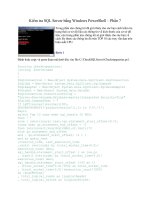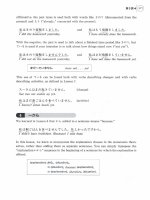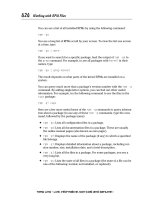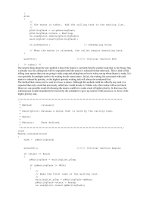advanced sql Functions in Oracle 10G phần 7 docx
Bạn đang xem bản rút gọn của tài liệu. Xem và tải ngay bản đầy đủ của tài liệu tại đây (613.41 KB, 42 trang )
Gives:
ADDR WHERE_IT_IS
1664 1/2 Springhill Ave 13
Or we can add anchors or “wildcard” match characters
as need be.
One must be careful when anchoring and using the
“other” arguments. Consider this example:
SELECT REGEXP_INSTR('Hello','^.',2) FROM dual;
Gives:
REGEXP_INSTR('HELLO','^.',2)
0
Here, we have anchored the pattern using the caret.
Then we have contradicted ourselves by asking the pat-
tern to begin looking in the second position of the
string. The contradiction results in a non-match
because the search string cannot be anchored at the
beginning and then searched from some other position.
To return to the other “extra” arguments we dis
-
cussed earlier, we noted that the Parameters optional
argument allowed for special use of the period
metacharacter. Let’s delve further into the use of those
arguments.
Suppose we had a table called Test_clob with these
contents:
DESC test_clob
234
Regular Expressions: String Searching and Oracle 10g
Giving:
Name Null? Type
NUM NUMBER(3)
CH CLOB
SELECT * FROM test_clob
Gives:
NUM CH
1 A simple line of text
2 This line contains two lines of text;
it includes a carriage return/line feed
Here are some examples of the use of the “n” and “m”
parameters:
Looking at the text in Test_clob where the value of
num = 2, we see that there is a new line after the semi-
colon. Further, the characters after the “x” in text may
be searched as a “t” followed by a semicolon, followed
by an “invisible” new line character, followed by a
space, then the letters “it”:
SELECT REGEXP_INSTR(ch, 't;. it',REGEXP_INSTR(ch,'x'),1,0,'n')
"where is 't' after 'x'?"
FROM test_clob
WHERE num = 2
Gives:
where is 't' after 'x'?
36
The query shows the use of nested functions (a
REGEXP_INSTR within another REGEXP_INSTR).
Further, we specified that we wanted some character
235
Chapter
|
7
after the semicolon. In order to specify that the “some
character” could be a new line, we had to use the “n”
optional parameter. Had we used some other optional
parameter, such as “i,” we would not have found the
pattern:
SELECT REGEXP_INSTR(ch, 't;. it',REGEXP_INSTR(ch,'x'),1,0,'i')
"where is 't' after 'x'?"
FROM test_clob
WHERE num = 2
Gives:
where is 't' after 'x'?
0
Using the default Parameter would yield the same
result:
SELECT REGEXP_INSTR(ch, 't;. it',REGEXP_INSTR(ch,'x'))
Would give:
where is 't' after 'x'?
0
The use of the “m” Parameter may be illustrated with
the same text in Test_clob. Suppose we want to know if
any lines in the CLOB column contain a space in the
first position (the second line starts with a space). We
write our query and use the default Parameter
argument:
SELECT REGEXP_INSTR(ch, '^ it')
"Space starting a line?"
FROM test_clob
WHERE num = 2
236
Regular Expressions: String Searching and Oracle 10g
Gives:
Space starting a line?
0
This query failed to show the space starting the second
line because we didn’t use the “m” optional argument.
The “m” argument for Parameters is specifically for
matching the caret-anchor to the beginning of a multi
-
line string. Here is the corrected version of the query:
SELECT REGEXP_INSTR(ch, '^ it',1,1,0,'m')
"Space starting a line?"
FROM test_clob
WHERE num = 2
Giving:
Space starting a line?
39
Brackets
The next special character we’ll introduce is the
bracket notation for a POSIX character class. If we use
brackets, [whatever], we are asking for a match of
whatever set of characters is included inside the brack
-
ets in any order. Suppose we wanted to devise a query
to find addresses where there is either an “i” or an “r.”
The query is:
SELECT addr, REGEXP_INSTR(addr, '[ir]') where_it_is
FROM addresses
237
Chapter
|
7
Giving:
ADDR WHERE_IT_IS
123 4th St. 0
4 Maple Ct. 0
2167 Greenbrier Blvd. 7
33 Third St. 6
One First Drive 6
1664 1/2 Springhill Ave 12
2003 Geaux Illini Dr. 15
All REs occur between quotes. The RE evaluates the
target from left to right until a match occurs. The RE
can be set up to look for one thing or, more frequently,
a pattern of things in a target string. In this case, we
have set up the pattern to find either an “i” or an “r”.
As another example, suppose we want to create a
match for any vowel followed by an “r” or “p”. The
query would look like this:
SELECT addr, REGEXP_INSTR(addr,'[aeiou][rp]') where_it_is
FROM addresses
WHERE REGEXP_INSTR(addr,'[aeiou][rp]') > 0
Giving:
ADDR WHERE_IT_IS
4 Maple Ct. 4
2167 Greenbrier Blvd. 14
33 Third St. 6
One First Drive 6
The matched characters are:
4Maple Ct.
2167 Greenbrier
Blvd.
33 Thir
d St.
One Fir
st Drive
238
Regular Expressions: String Searching and Oracle 10g
Ranges (Minus Signs)Ranges (Minus Signs)
We may also create a range for a match using a minus
sign. In the following example, we will ask for the let
-
ters “a” through “j” followed by an “n”:
SELECT addr, REGEXP_INSTR(addr,'[a-j]n') where_it_is
FROM addresses
WHERE REGEXP_INSTR(addr,'[a-j]n') > 0
Gives:
ADDR WHERE_IT_IS
2167 Greenbrier Blvd. 9
1664 1/2 Springhill Ave 13
2003 Geaux Illini Dr. 15
The matched characters are:
2167 Greenbrier Blvd.
1664 1/2 Sprin
ghill Ave
2003 Geaux Illin
iDr
REGEXP_LIKE
To illustrate another RE function and to continue with
illustrations of matching, we will now use the Boolean-
returning REGEXP_LIKE function. The complete
function definition is:
REGEXP_LIKE(String to search, Pattern, [Parameters]),
where String to search, Pattern, and Parameters are
the same as for REGEXP_INSTR. As with
REGEXP_INSTR, the Parameters argument is usu
-
ally used only in special situations. To introduce
239
Chapter
|
7
REGEXP_LIKE, let’s begin with the older LIKE
function. Consider the use of LIKE in this query:
SELECT addr
FROM addresses
WHERE addr LIKE('%g%')
OR addr LIKE ('%p%')
Giving:
ADDR
4 Maple Ct.
1664 1/2 Springhill Ave
We are asking for the presence of a “g” or a “p”. The
“%” sign metacharacter matches zero, one, or more
characters and here is used before and after the letter
we seek. The LIKE predicate has an RE counterpart
using bracket classes that is simpler. The
REGEXP_LIKE would look like this:
SELECT addr
FROM addresses
WHERE REGEXP_LIKE(addr,'[gp]')
Giving:
ADDR
4 Maple Ct.
1664 1/2 Springhill Ave
Here, we are asking for a match in “addr” for either a
“g” or a “p”. The order of occurrence of [gp] or [pg] is
irrelevant.
240
Regular Expressions: String Searching and Oracle 10g
Negating CaretsNegating Carets
As previously mentioned, the caret (“^”) may be
either an anchor or a negating marker. We may negate
the string we are looking for by placing a negating
caret at the beginning of the string like this:
SELECT addr
FROM addresses
WHERE REGEXP_LIKE(addr,'[^gp]')
Giving:
ADDR
123 4th St.
4 Maple Ct.
2167 Greenbrier Blvd.
33 Third St.
One First Drive
1664 1/2 Springhill Ave
2003 Geaux Illini Dr.
It appears at first that the negating caret did not work.
However, look at what was asked for and what was
matched. We asked for a match anywhere in the string
for anything other than a “g” or a “p” and we got it —
all rows have something other than a “g” or a “p”.
To further illustrate the negating caret here, sup
-
pose we add a nonsense address that contains only “g”s
and “p”s:
SELECT * FROM addresses
241
Chapter
|
7
Gives:
ADDR
123 4th St.
4 Maple Ct.
2167 Greenbrier Blvd.
33 Third St.
One First Drive
1664 1/2 Springhill Ave
2003 Geaux Illini Dr.
gggpppggpgpgpgpgp
Now execute the RE query again:
SELECT * FROM addresses
WHERE REGEXP_LIKE(addr,'[gp]')
Gives:
ADDR
4 Maple Ct.
1664 1/2 Springhill Ave
gggpppggpgpgpgpgp
and use the negating caret:
SELECT * FROM addresses
WHERE REGEXP_LIKE(addr,'[^gp]')
Gives:
ADDR
123 4th St.
4 Maple Ct.
2167 Greenbrier Blvd.
33 Third St.
One First Drive
242
Regular Expressions: String Searching and Oracle 10g
1664 1/2 Springhill Ave
2003 Geaux Illini Dr.
If we wanted a “non-(‘g’ or ‘p’)” followed by something
else like an “l” (a lowercase “L”), we could write the
query like this:
SELECT addr
FROM addresses
WHERE REGEXP_LIKE(addr,'[^gp]l')
Giving:
ADDR
2167 Greenbrier Blvd.
1664 1/2 Springhill Ave
2003 Geaux Illini Dr.
Here, the match succeeds because we are looking for a
letter that is not a “g” or “p”, followed by the letter “l”.
The matches are:
2167 Greenbrier Blvd.
1664 1/2 Springhil
l Ave
2003 Geaux Il
lini Dr.
Bracketed Special ClassesBracketed Special Classes
Special classes are provided that use a special match
-
ing paradigm. Suppose we want to find any row where
there are digits or lack of digits. The bracketed expres
-
sion [[:digit]] matches numbers. If we wanted to find all
addresses that begin with a number we could do this:
SELECT addr
FROM addresses
WHERE REGEXP_INSTR(addr,'^[[:digit:]]') = 1
243
Chapter
|
7
Giving:
ADDR
32 O'Neal Drive
32 O'Hara Avenue
123 4th St.
4 Maple Ct.
2167 Greenbrier Blvd.
33 Third St.
1664 1/2 Springhill Ave
2003 Geaux Illini Dr.
Another example:
SELECT addr
FROM addresses
WHERE REGEXP_INSTR(addr,'[[:digit:]]') = 0
Giving:
ADDR
One First Drive
In both queries, the matching expression contains
[:digit:], which is a “match any numeric digit” class.
The brackets around the “:digit:” part come with the
expression. To use [:digit:] for “match any numeric
digit” we have to enclose the class within brackets or
else we would be asking for the component parts.
[[:digit:]] says to match digits.
[:digit:] by itself says “match a colon or a ‘d’ or an
‘i’,” etc. Match any letter in the collection. The fact that
some characters are repeated is inconsequential.
So in the second example, when we used [[:digit:]]
inside of the REGEXP_INSTR function, we found the
row where digits were not in the target string. If we
wanted another expression that would match “addr”
where there were no digits at all anywhere in the
244
Regular Expressions: String Searching and Oracle 10g
string we could have used the bracket notation, a range
of numbers, and the NOT predicate.
SELECT addr
FROM addresses
WHERE NOT REGEXP_LIKE(addr,'[0-9]')
Gives:
ADDR
One First Drive
It is a bit dangerous to try to use negation inside of the
match expression because of any non-digit matches
(letters, spaces, punctuation). It is far easier to find all
of what you don’t want and then “NOT it.” Asking for
any match for a “non-zero to nine” returns all rows
because all rows have a non-digit:
SELECT addr
FROM addresses
WHERE REGEXP_LIKE(addr,'[^0-9]')
Gives:
ADDR
123 4th St.
4 Maple Ct.
2167 Greenbrier Blvd.
33 Third St.
One First Drive
1664 1/2 Springhill Ave
2003 Geaux Illini Dr.
Similarly, matching for a non-digit gives all rows:
SELECT addr
FROM addresses
WHERE NOT REGEXP_LIKE(addr,'[[:digit]]')
245
Chapter
|
7
Gives:
ADDR
123 4th St.
4 Maple Ct.
2167 Greenbrier Blvd.
33 Third St.
One First Drive
1664 1/2 Springhill Ave
2003 Geaux Illini Dr.
Other Bracketed ClassesOther Bracketed Classes
Similar to the [:digit:] class, there are other classes:
t
[:alnum:] matches all numbers and letters
(alphanumerics).
t
[:alpha:] matches characters only.
t
[:lower:] matches lowercase characters.
t
[:upper:] matches uppercase characters.
t
[:space:] matches spaces.
t
[:punct:] matches punctuation.
t
[:print:] matches printable characters.
t
[:cntrl:] matches control characters.
These classes may be used the same way the [:digit:]
class was used. For example:
SELECT addr,
REGEXP_INSTR(addr,'[[:lower:]]')
FROM addresses
WHERE REGEXP_INSTR(addr,'[[:lower:]]') > 0
246
Regular Expressions: String Searching and Oracle 10g
Gives:
ADDR REGEXP_INSTR(ADDR,'[[:LOWER:]]')
123 4th St. 6
4 Maple Ct. 4
2167 Greenbrier Blvd. 7
33 Third St. 5
One First Drive 2
1664 1/2 Springhill Ave 11
2003 Geaux Illini Dr. 7
Notice that in each case, the position of the first occur
-
rence of a lowercase letter is returned.
The Alternation OperatorThe Alternation Operator
When specifying a pattern, it is often convenient to
specify the string using logical “OR.” The alternation
operator is a single vertical bar: “|”. Consider this
example:
SELECT addr,
REGEXP_INSTR(addr,'r[ds]|pl')
FROM addresses
WHERE REGEXP_INSTR(addr,'r[ds]|pl') > 0
Which gives:
ADDR REGEXP_INSTR(ADDR,'R[DS]|PL')
4 Maple Ct. 5
33 Third St. 7
One First Drive 7
In this expression, we are asking for either an “r” fol
-
lowed by a “d” or an “s” OR the letter combination “p”
followed by an “l”.
247
Chapter
|
7
Repetition Operators — akaRepetition Operators — aka
“Quantifiers”
REs have operators that will repeat a particular pat
-
tern. For example, suppose we first search for vowels
in any address.
Recall our current Addresses table:
SELECT * FROM addresses
Gives:
ADDR
123 4th St.
4 Maple Ct.
2167 Greenbrier Blvd.
33 Third St.
One First Drive
1664 1/2 Springhill Ave
2003 Geaux Illini Dr.
Now, to select only addresses that contain vowels we
can use this statement:
SELECT addr, REGEXP_INSTR(addr,'[aeiou]')
where_pattern_starts
FROM addresses
WHERE REGEXP_INSTR(addr,'[aeiou]') > 0
Gives:
ADDR WHERE_PATTERN_STARTS
4 Maple Ct. 4
2167 Greenbrier Blvd. 8
33 Third St. 6
One First Drive 3
248
Regular Expressions: String Searching and Oracle 10g
1664 1/2 Springhill Ave 13
2003 Geaux Illini Dr. 7
Note that the address “123 4th St.” is not in the result
set because it contains no vowels.
Now, let’s look for two consecutive vowels:
SELECT addr,
REGEXP_INSTR(addr,'[aeiou][aeiou]')
where_pattern_starts
FROM addresses
Gives:
ADDR WHERE_PATTERN_STARTS
2167 Greenbrier Blvd. 8
2003 Geaux Illini Dr. 7
We can simplify the writing of the latter RE with a
repeat operator, which is put in curly brackets {}. Here
is an example of repeating the vowel match a second
time:
SELECT addr,
REGEXP_INSTR(addr,'[aeiou]{2}') where_pattern_starts
FROM addresses
WHERE REGEXP_INSTR(addr,'[aeiou]{2}') > 0
Giving:
ADDR WHERE_PATTERN_STARTS
2167 Greenbrier Blvd. 8
2003 Geaux Illini Dr. 7
A quantifier {m} matches exactly m repetitions of the
preceding RE; e.g., {2} matches exactly two occur
-
rences. Note that there is no match for one occurrence
of a vowel because two were specified in this example.
249
Chapter
|
7
The quantifier may be expressed as a two-part
argument {m,n} where m,n specifies that the match
should occur from m to n times.
Now, suppose we are more specific with our quanti
-
fier in that we want matches from two to three times:
SELECT addr,
REGEXP_INSTR(addr,'[aeiou]{2,3}') where_pattern_starts
FROM addresses
WHERE REGEXP_INSTR(addr,'[aeiou]{2,3}') > 0
Gives:
ADDR WHERE_PATTERN_STARTS
2167 Greenbrier Blvd. 8
2003 Geaux Illini Dr. 7
Had we specified from three to five consecutive vowels,
we’d get this:
SELECT addr,
REGEXP_INSTR(addr,'[aeiou]{2,3}') where_pattern_starts
FROM addresses
WHERE REGEXP_INSTR(addr,'[aeiou]{3,5}') > 0
Gives:
ADDR WHERE_PATTERN_STARTS
2003 Geaux Illini Dr. 7
Another version of the repetition operator would say,
“at least m times” with {m,}:
SELECT addr,
REGEXP_INSTR(addr,'[aeiou]{2,3}')
where_pattern_starts
FROM addresses
WHERE REGEXP_INSTR(addr,'[aeiou]{3,}') > 0
SQL> /
250
Regular Expressions: String Searching and Oracle 10g
Giving:
ADDR WHERE_PATTERN_STARTS
2003 Geaux Illini Dr. 7
This match succeeds because there are three vowels in
a row in the word “Geaux,” and the query asks for at
least three consecutive vowels.
More Advanced Quantifier RepeatMore Advanced Quantifier Repeat
Operator Metacharacters — *, %,Operator Metacharacters — *, %,
and ?and ?
Suppose we wanted to match a letter, e.g., “e”, followed
by any number of “e”s later in the expression. First of
all, the RE “ee” would match two “e”s in a row, but not
“e”s separated by other characters.
SELECT addr,
REGEXP_INSTR(addr,'ee') where_pattern_starts
FROM addresses
WHERE REGEXP_INSTR(addr,'ee') > 0
Gives:
ADDR WHERE_PATTERN_STARTS
2167 Greenbrier Blvd. 8
If we wanted to find a letter and then whatever until
there was another of the same letter, we could start
with a query like this for “e”s:
251
Chapter
|
7
SELECT addr,
REGEXP_INSTR(addr,'e.e') where_pattern_starts
FROM addresses
WHERE REGEXP_INSTR(addr,'e.e') > 0
Giving:
no rows selected
The problem here is that we asked for an “e” followed
by anything, followed by another “e”, and we don’t
have that configuration in our data. To match any num
-
ber of things between the same letters we may use one
of the repeat operators. The three operators are:
t
+ — which matches one or more repetitions of
the preceding RE
t
* — which matches zero or more repetitions of
the preceding RE
t
? — which matches zero or one repetition of the
preceding RE
Suppose we reconsider our data and ask for “i”s
instead of “e”s (“i” followed by any one character, fol-
lowed by another “i”). Had we asked for “i”s, we get a
result because our data has two “i”s separated by some
other letter.
SELECT addr,
REGEXP_INSTR(addr,'i.i') where_pattern_starts
FROM addresses
WHERE REGEXP_INSTR(addr,'i.i') > 0
Gives:
ADDR WHERE_PATTERN_STARTS
2003 Geaux Illini
Dr. 15
252
Regular Expressions: String Searching and Oracle 10g
To further illustrate how these repetition matches
work, we will introduce another RE now available in
Oracle 10g: REGEXP_SUBSTR.
REGEXP_SUBSTR
As with the ordinary SUBSTR, REGEXP_SUBSTR
returns part of a string. The complete syntax of
REGEXP_SUBSTR is:
REGEXP_SUBSTR(String to search, Pattern, [Position,
[Occurrence, [Return-option, [Parameters]]]])
The arguments are the same as for INSTR. For exam-
ple, consider this query:
SELECT REGEXP_SUBSTR('Yababa dababa do','a.a') FROM dual
Gives:
REG
aba
Here, we have set up a string (“Yababa dababa do”)
and returned part of it based on the RE “a.a”.
We can repeat the metacharacter using the repeat
operators. The pattern “a.a” looks for an “a” followed
by anything followed by an “a”. If we use a repeat
operator after the period, then the pattern looks for a
repeated “wildcard.” Therefore, the pattern “a.*a”
looks for an “a” followed by any character zero or more
times (because it’s a “*”), followed by another “a”. We
can see the effect of using our repeat quantifiers with
these simple examples:
253
Chapter
|
7
“*” (match zero or more repetitions):
SELECT REGEXP_SUBSTR('Yababa dababa do','a.*a') FROM dual
Gives:
REGEXP_SUBST
ababa dababa
The query matches an “a” followed by anything
repeated zero or more times followed by another “a”.
In this case, the matching occurs from the first “a” to
the last.
“+” (match one or more repetitions):
SELECT REGEXP_SUBSTR('Yababa dababa do','a.+a') FROM dual
Gives:
REGEXP_SUBST
ababa dababa
Similar to the first example, the use of “+” requires at
least one intervening character between the first and
last “a”.
“?” (match exactly zero or one repetition):
SELECT REGEXP_SUBSTR('Yababa dababa do','a.?a') FROM dual
Gives:
REG
aba
In the case of “+” and “*” we have examples of greedy
matching — matching as much of the string as possible
254
Regular Expressions: String Searching and Oracle 10g
to return the result. In the “*” case we are returning a
substring based on zero or more characters between
the “a”s. In the case of the greedy operator “*” as
many characters as possible are matched; the match
takes place from the first “a” to the last one.
The same logic is applied to the use of “+” — also
greedy and matching from one to as many “a”s as the
matching software/algorithm can find.
The “?” repetition metacharacter matches zero or
one time and the match is satisfied after finding an “a”
followed by something (“.”) (here a “b”), and then fol
-
lowed by another “a”. The “?” repeating metacharacter
is said to be non-greedy. When the match is satisfied,
the matching process quits.
To see the difference between “*” and “+”, con-
sider the next four queries.
Here, we are asking to match an “a” and zero or
more “b”s:
SELECT REGEXP_SUBSTR('a','ab*') FROM dual
Gives:
R
-
a
Since there are no more “b”s in the target string (“a”),
the match succeeds and returns the letter “a”.
If we had a series of “b”s immediately following the
“a”, we would get them all due to our greedy “*”:
SELECT REGEXP_SUBSTR('abbbb','ab*') FROM dual
Gives:
REGEX
abbbb
255
Chapter
|
7
If we changed the “*” to “+” we would be insisting on
matching at least one “b”; with only a single “a” in a
target string we get no result:
SELECT REGEXP_SUBSTR('a','ab+') FROM dual
Giving:
R
-
But, if we have succeeding “b”s, we get the same
greedy result as with “*”:
SELECT REGEXP_SUBSTR('abbbb','ab+') FROM dual
Giving:
REGEX
abbbb
In our table of addresses, if we want an “e” followed by
any number of other characters and then another “e”,
we may use each of the repeat operators with these
results:
SELECT addr,
REGEXP_SUBSTR(addr,'e.+e'),
REGEXP_INSTR(addr, 'e.+e') "@"
FROM addresses
Giving:
ADDR REGEXP_SUBSTR(ADDR,'E.+E') @
123 4th St. 0
4 Maple Ct. 0
2167 Greenbrier Blvd. eenbrie 8
33 Third St. 0
One First Drive e First Drive 3
256
Regular Expressions: String Searching and Oracle 10g
1664 1/2 Springhill Ave 0
2003 Geaux Illini Dr. 0
Note the greedy “+” finding one or more things
between “e”s; it “stretches” the letters between “e”s as
far as possible. Note that the query returned “eenbrie”
and not just “ee”.
SELECT addr,
REGEXP_SUBSTR(addr,'e.*e')
FROM addresses
Gives:
ADDR REGEXP_SUBSTR(ADDR,'E.*E') @
123 4th St. 0
4 Maple Ct. 0
2167 Greenbrier Blvd. eenbrie 8
33 Third St. 0
One First Drive e First Drive 3
1664 1/2 Springhill Ave 0
2003 Geaux Illini Dr. 0
Again, our greedy “*” finds multiple characters
between “e”s. But look what happens if we use the
non-greedy “?”:
SELECT addr,
REGEXP_SUBSTR(addr,'e.?e')
FROM addresses
Gives:
ADDR REGEXP_SUBSTR(ADDR,'E.?E')
123 4th St.
4 Maple Ct.
2167 Greenbrier Blvd. ee
33 Third St.
One First Drive
257
Chapter
|
7
1664 1/2 Springhill Ave
2003 Geaux Illini Dr.
In the first two examples, we matched an “e” followed
by other characters, then another “e”. In the “?” case,
we got only two non-null rows returned because “?” is
non-greedy.
Empty Strings and the ?Empty Strings and the ?
Repetition CharacterRepetition Character
The “?” metacharacter seeks to match zero or one rep
-
etition of a pattern. This characteristic works well as
long as one expects some match to occur. Consider this
example (from the “Introducing Oracle Regular
Expressions” white paper):
SELECT REGEXP_INSTR('abc','d') FROM dual
Gives:
REGEXP_INSTR('ABC','D')
0
We get zero because the match failed. On the other
hand, if we include the “?” repetition character, we get
this seemingly odd result:
SELECT REGEXP_INSTR('abc','d?') FROM dual
Gives:
REGEXP_INSTR('ABC','D?')
1
The “?” says to match zero or one time. Since no “d”
occurs in the string, then it is matching the empty
258
Regular Expressions: String Searching and Oracle 10g









